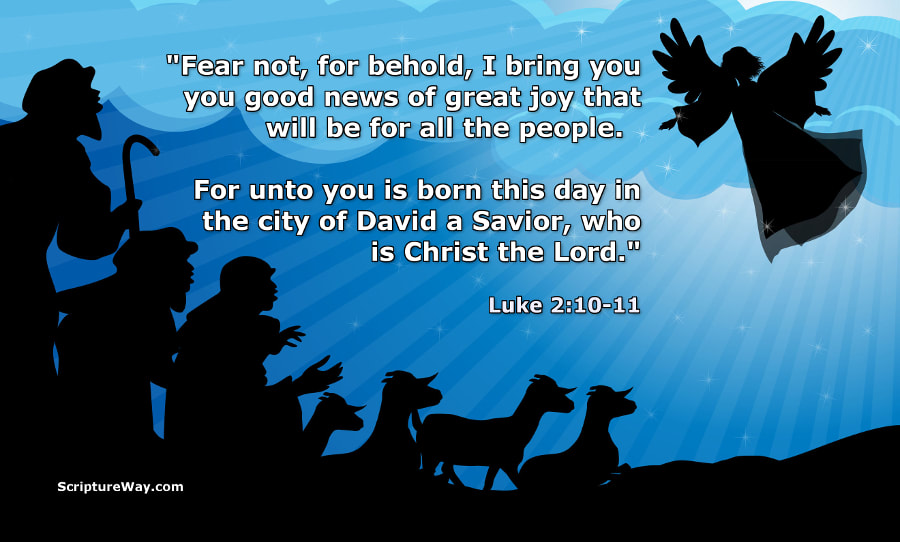"And the angel said to them, 'Fear not, for behold, I bring you good news of great joy that will be for all the people. For unto you is born this day in the city of David a Savior, who is Christ the Lord.'" (Luke 2:10-11)
This article is the third in a series on the "'Fear Nots' of the Bible" (Ref. 1, Ref. 2). This article presents the "Fear not" angelic encounters with Zacharias, Mary, and the shepherds in Luke chapters 1 and 2.
Consider. Do you regard the announcement of the birth of Jesus as good news? If so, are you telling others? Are you rejoicing because you know Jesus as your Savior?
Introduction
Angels are active in both the Old Testament and New Testament scriptures. Angels bring announcements and special messages of encouragement from God to specific people.
In the New Testament, the Greek word for angel is aggelos. Aggelos means a messenger or delegate, someone sent by God to proclaim His message (Ref. 3). Matthew chapter 1 describes the first appearance of an angel in the New Testament. An angel of the Lord appears to Joseph in a dream, saying, "Joseph, thou son of David, fear not to take unto thee Mary thy wife: for that which is conceived in her is of the Holy Spirit" (Matthew 1:20). Supernatural angelic appearances to humans in the scriptures often, but not always, begin with "Fear not," also translated as "Do not fear" or "Do not be afraid" (Ref. 1, Ref. 2). The Angel Gabriel Appears to Zacharias
Luke 1:5-25 tells us about the angel Gabriel's appearance to the priest Zacharias and the angel's message foretelling the birth of John the Baptist.
When Gabriel appears to Zacharias in the temple, Zacharias is troubled and fearful (Luke 1:12). In Luke 1:13 NKJV, the angel's message to Zacharias has four main points: 1) "Do not be afraid" ("Fear not" in the KJV), 2) "Your prayer is heard," 3) "Your wife Elizabeth will bear you a son" and 4) "You shall call his name John." Gabriel tells Zacharias that John will be great in the sight of the Lord (Luke 1:15), will be filled with the Holy Spirit (Luke 1:15), will turn back many children of Israel to the Lord (Luke 1:16), and will go before the Lord (Luke 1:17). The angel Gabriel tells Zacharias that this message is good news, also translated as glad tidings (Luke 1:19 NASB, Luke 1:19 NKJV). The Greek word for good news and glad tidings is euaggelizó (Ref. 4). We will see the same word again in Luke 2:10. Scripture tells us that Zacharias and Elizabeth were righteous and blameless in following the Lord's commandments (Luke 1:5-6). However, Zacharias does not believe (have faith in, trust in) the angel's "good news" message (Luke 1:20, Ref. 5). Disbelief in God's message has consequences. Zacharias is not able to speak until the prophecy is fulfilled when John is born (Luke 1:57, 63). When his mouth is opened, Zacharias speaks and praises God (Luke 1:64). The Angel Gabriel Appears to Mary
Gabriel greets Mary with the words, "Rejoice, highly favored one, the Lord is with you; blessed are you among women!" (Luke 1:28) The Greek word for favored is charitoó, which means highly-favored because receptive to God's grace (Ref. 7).
The Scripture says, "Mary was greatly troubled at his words and wondered what kind of greeting this might be" (Luke 1:29). Unlike Zacharias (Luke 1:12), Mary was not terrified by the angel's appearance or presence. However, she was perplexed by what the angel meant by his greeting. The angel responds and tells her, "Fear not, Mary: for thou hast favour with God"(Luke 1:30 KJV).
Gabriel then states the substance of his message to Mary. "And behold, you will conceive in your womb and bring forth a Son, and shall call His name Jesus. He will be great, and will be called the Son of the Highest; and the Lord God will give Him the throne of His father David. And He will reign over the house of Jacob forever, and of His kingdom there will be no end" (Luke 1:31-33). Then Mary asks Gabriel a very interesting question - "How can this be, since I do not know a man?" (Luke 1:34) The Greek word for know in this verse is ginóskó, which means know through personal experience and in this context refers to sexual intimacy (Ref. 8). Mary did not doubt the angel's word. From her humility and modesty she wondered how her pregnancy could be effected in her virgin state (Ref. 9). The angel Gabriel replies and says, "The Holy Spirit will come upon you, and the power of the Highest will overshadow you; therefore, also, that Holy One who is to be born will be called the Son of God" (Luke 1:35). Gabriel also says, "For with God nothing will be impossible" (Luke 1:37). Mary then humbly speaks her assent and consent to the will of God. "Behold the maidservant of the Lord! Let it be to me according to your word" (Luke 1:38). The Greek word for Let it be is ginomai, which means come into being, happen, and become (Ref. 10). The angel then departs, having accomplished what he came for (Luke 1:38). The Angel Announces the Savior's Birth to the Shepherds “Fear not, for behold, I bring you good news of great joy that will be for all the people” (Luke 2:10) - LUMO Project - Used by Permission “Fear not, for behold, I bring you good news of great joy that will be for all the people” (Luke 2:10) - LUMO Project - Used by Permission
In Luke 2:8-14 the gospel writer describes the glorious announcement of the birth of the Savior. Previously, Luke had described the Angel Gabriel's message to Mary about the conception of Jesus, the Son of God (Luke 1:26-38). In the verses immediately before the angel's announcement to the shepherds (Luke 2:1-7), the gospel account informs us that Joseph and Mary had traveled from Nazareth to Bethlehem, and that her Son now was born.
The Scripture tells us that an angel (name not identified) suddenly stands before shepherds who were outside Bethlehem at night (Luke 2:8-9). The scripture states "And the glory of the Lord shone around them" (Luke 2:9, italics added). The brilliant glory of the Lord around the shepherds during the angel's announcement is unique compared to the appearance of Gabriel to Zacharias in Luke 1:8-25 and to Mary in Luke 1:26-38. The Apostle Paul reports a similar encounter with bright light around himself and his traveling companions on the way to Damascus (Acts 26:13).
The shepherds "feared with a great fear" at the angel's sudden appearance (Luke 2:9 DRA). The King James Version famously says "they were sore afraid" (Luke 2:9 KJV).
The angel tells the shepherds, "Fear not" (Luke 2:10). Yes, the appearance of the angel was supernatural; however, the angel's message about the birth of Christ is good news, not bad news. "For behold, I bring you good news of great joy that will be for all the people. For unto you is born this day in the city of David a Savior, who is Christ the Lord" (Luke 2:10-11). The Greek verb for bring good news is euaggelizó which also is translated as bring good tidings (Ref. 4).
The Greek word for Savior in Luke 2:11 is sótér, which means savior, deliverer, preserver (Strong's Concordance, Ref. 11). Jesus Christ is our Savior because he "saves believers from their sins and delivers them into His safety" (HELPS Word-studies, Ref. 11, 1 John 4:14, 1 Timothy 1:15, Luke 19:10).
The shepherds considered the angel's message, and then they went with haste, without delay to see the Savior themselves (Luke 2:15-16). After they had seen Jesus, they told others the good news about Jesus (Luke 2:17). Then the shepherds returned, "glorifying and praising God for all they had heard and seen" (Luke 2:20).
Apply. Like the shepherds, have you accepted the good news of the Savior for yourself? If not, then believe that he is the Son of God as described in the scriptures, and ask him to forgive your sins. Then go on your way rejoicing and tell others the good news about Jesus.
References
1. http://www.scriptureway.com/home/fear-nots-of-the-old-testament 2. http://www.scriptureway.com/home/fear-nots-of-jesus 3. https://biblehub.com/greek/32.htm 4. https://biblehub.com/greek/2097.htm 5. https://biblehub.com/greek/4100.htm 6. https://biblehub.com/greek/3933.htm 7. https://biblehub.com/greek/5487.htm 8. https://biblehub.com/greek/1097.htm 9. https://biblehub.com/commentaries/benson/luke/1.htm 10. https://biblehub.com/greek/1096.htm 11. https://biblehub.com/greek/4990.htm
1 Comment
Ronald K Reuse
12/23/2019 11:01:58 am
The fear of the Lord is the beginning of wisdom.
Reply
Your comment will be posted after it is approved.
Leave a Reply. |
Daily Bible Verse(Click the link above) AuthorMr. Whitney V. Myers. Christian. For more information, please visit the Author Page. Posting ScheduleI plan to provide new postings about once a month. Planned Topics(subject to change) Recent Posts(most recent three months) Popular Posts(top 10) Categories
All
Archives
July 2024
|
|
Copyright 2018-2024 Whitney V. Myers |
Listed in Feedspot's Top 100 Bible Study Blogs and Websites |


 RSS Feed
RSS Feed
